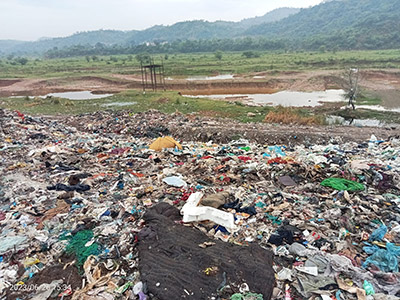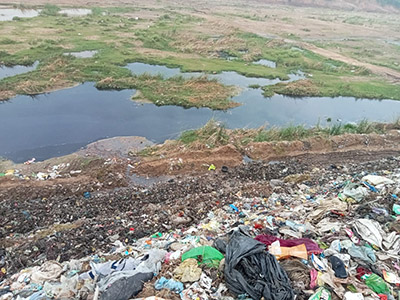Shimla: In what would serve as a benchmark order for solid waste pollution management in the state, the High Court of Himachal Pradesh has taken a no-nonsense approach to tackle laxity in solid waste management. The court has directed Pollution regulator and MOEF to conduct onsite inspection of Baddi plant and makes Kullu waste plant functional before next date of hearing.
The court bench of senior judge of the High Court Justice Tarlok Singh Chauhan has issued this orer today, intensifying scrutiny of the operations of the Solid Waste Management Plant at Kenduwal Village, Tehsil Baddi, H.P., with a stern action ensuring strict adherence to environmental norms.
What shocked the High Court are the visuals of the plant cited by lawyer of petitioner to prove his point.
The plant was set up near the house of Suleman, petitioner, whose life including that of others has been made a live hell by the plant as none is bothered to manage the plant.
The plant also leachates into the Sirsa river adding to the water pollution of the river that threw all environment laws to the wind. The river drains into the plains of the Punjab,
Serious concerns have been raised by the court regarding the alleged non-compliance with the 36 pre-conditions mandated for the construction and operation of the plant.
In the case of *Suleman Versus Union of India & Others* (CWP No.2369 of 2018), the petitioner's counsel, Mr. Deven Khanna, has asserted that not a single one of these crucial conditions, vital for the protection of the environment and public health, are being followed.
As a result of this alarming non-compliance, the court has issued directives for immediate action.
The Environment Engineer of H.P. State Pollution Control Board and a representative from the Ministry of Environment have been ordered to conduct an on-site inspection and submit a comprehensive report detailing the adherence to each specific condition outlined in the Environment Clearance.
This report must also include an updated Monitoring Report.
Furthermore, the court has demanded a thorough account of the implementation of the Plastic Waste Management Rules, 2016, with a particular emphasis on the "Extended Producer Responsibility" (EPR) of various stakeholders involved in plastic waste management.
The 3rd respondent is required to provide minutes from a meeting held on 26th September 2023, outlining the assessment of EPR fulfillment and subsequent actions taken.
With a clear intent to drive action, the court has set a deadline for the functioning of the Solid Waste Project at Kullu by the next hearing.
Relevant authorities, including UDD, HPPSC, and MC Kullu, have been instructed to ensure that waste is not disposed of in any of the state's water bodies, making all Urban Local Bodies (ULBs) and Rural Local Bodies (RLBs) personally accountable for enforcing the Solid Waste Management Rules and Plastic Waste Management Rules, 2016, and adhering to prior court directions.
The court has demanded detailed information concerning the implementation of the Plastic Waste (Management and Handling) Rules, 2011, the Plastic Waste Management (Amended) Rules, 2022, and the Himachal Pradesh Non-Biodegradable Garbage (Control) Act, 1995. Respondents are required to furnish particulars about the registration of producers, importers, and brand-owners with the competent authority, as well as the actions taken in this regard.
Apart from this, the court seeks information from the government authorities on identified sites under the Construction and Demolition Waste Management Rules, 2016, and steps taken under the Himachal Pradesh Non-Biodegradable Garbage (Control) Act, 1995.
This resolute stance by the High Court of Himachal Pradesh will go a long way in ensuring strict compliance with environmental norms and regulations, particularly in the management of solid and construction waste.
The court's actions aim to safeguard the environment and public health within Himachal Pradesh.




